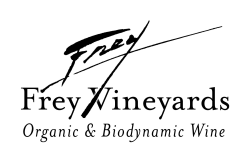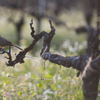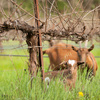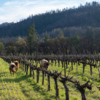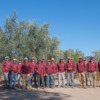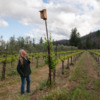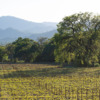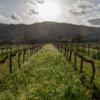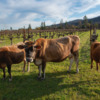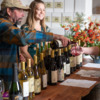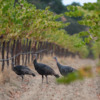Frey
Videos
Frey Vineyards - First Certified Organic and Biodynamic Winery in America
Profile video of Frey Vineyards, the first winery in America to be be certified organic and biodynamic. Created for Eco Conscious Living. https://youtu.be/z-3jIAYMeG8 Production by Nathan Rupp of MirrorBox Productions http://mirrorboxproductions.com/
... Profile video of Frey Vineyards, the first winery in America to be be certified organic and biodynamic. Created for Eco Conscious Living.
https://youtu.be/z-3jIAYMeG8
Production by Nathan Rupp of MirrorBox Productions
http://mirrorboxproductions.com/ ... A quick update on the progress of our new organic winery and tasting room.
More info on our BioFiltro water treatment system on our blog:
http://www.freywine.com/blog/BioFiltro-Water-Filtration-System
Check out BioFiltro's website:
http://biofiltro.com/en/
Frey Vineyards - First Certified Organic and Biodynamic Winery in America

Update on the progress of our new winery – November 2018
At Frey Vineyards we combine the best of modern and traditional wine making methods. Through minimal manipulation in the cellar, we allow the wines to express the authentic character of our soils and climate. For over three decades we have been vanguards in crafting wine without added sulfites, a synthetic preservative added to most other wines (even wines made with organically grown grapes!) that can cause adverse allergic reactions in some people.
For 35 years we have produced premium wines made without added sulfites or other preservatives. Our award-winning wines are sold throughout the USA and abroad. The use of modern winemaking equipment and organic agricultural techniques create delicious and stable additive-free wines. We are excited to be part of the growing natural foods movement, where organic wine is a perfect compliment to organic gourmet cuisine. Enthusiasm for organic and sulfite-free wines is growing.
Frey Vineyards has been a vanguard in organic and Biodynamic agriculture in our local area. We practice innovative intercropping by growing grain, vegetables, and crops for culinary oils between some of our vineyard rows. We also source fruit from over 20 certified organic and biodynamic grape growers in Mendocino and Lake Counties.
Philosophy
One of the basic tenants of Biodynamic agriculture is to support biodiversity within the farm landscape. At Frey Vineyards the appreciation for its biodiversity and beauty is a bond that all of the family shares.
The land lies just two miles below the source of the Russian River. No active logging or agriculture goes on above us, so our watershed is unspoiled and pristine. One thousand acres, spread between 900 ft. and 2600 ft., hold a mix of oak and conifer forests, meadows and upland chaparral. Oak and madrone, ancient redwood, Douglas fir, Tanbark-oak (Lithocarpus densiflorus), and ponderosa pine are the primary forest trees. Upland meadows are untouched and the lower 100 acres of meadows have been planted in certified organic and Biodynamic vineyards, leaving 90% of the land as home to a wide mix of plants, and animals such as bears, mountain lions, bobcats, coyotes, foxes, raccoons, rabbits, skunks. Lizards, frogs, and salamanders coexist with an assortment of mushrooms that appear briefly during the rainy months.
Upholding Biodynamic agriculture standards protects natural habitats and supports and maintains wildlife corridors for many species. Hedgerows and forest are home for beneficial insects and birds, who then keep agricultural pests in a healthy balance. For example, a common grape pest is the grape leafhopper (Erythtoneura), which sucks sap from the grape leaves, robbing the plant of essential nutrients. This can stunt the vines, delaying fruit maturity. Fortunately, a very tiny parasitic wasp (Anagrus epos Girault) over winters in the blackberries bordering our vineyards. In July the female wasps lay their eggs within the eggs of grape leaf hoppers, killing the leaf hopper eggs. This natural biological control removes the need for diozinon or malathion insecticides.
Many bird species enter the vineyards and feed on insects, such as black phoebes, swallows, blackbirds and bluebirds. The bluebirds especially enjoy the birdhouses placed near the ponds to raise their young each spring. Kingfishers, Great Blue Herons, Green Herons, and Great White Egrets frequent the ponds as well. We are also visited by the spectacular Pileated Woodpecker (Dryocopus pileatus), who swoops down from our forests to supplement its diet with vineyard insects. We suspect that it nibbles at the berries when they are ripe, but the very shy bird will not tolerate close approaches. This unique woodpecker, as big as a crow, is a close cousin of the possibly-extinct Ivory-billed Woodpecker of the eastern U.S. Woodpecker in nature Conserving biodiversity also greatly enhances water quality. Perennial vegetation along our riparian zones helps to control erosion and filters runoff, protecting the purity of our springs and streams it flows through our land and beyond.
Frey Vineyards supports the work of the Wild Farm Alliance. Their website quotes Aldo Leopold, the father of wildlife ecology: "Land, then, is not merely soil; it is a fountain of energy flowing through a circuit of soils, plants and animals." Learn more at: Wild Farm Alliance.
Protecting Local Forests: Our beautiful home ranch provides us with rich, healthy soil to grow our top quality grape vineyards – but that’s only 10% of the land under our care. The other 90% remains wild forestland, home to diverse species of native forests, shrubs, grasses and animals. Protected forestland is vital to a healthy, balanced eco-system, for ourselves, our local community, and our planet. Local botanist and forester, Estelle Palley Clifton works with us to identify and map the plant species and we are in the process of developing a forest management plan to ensure a well maintained eco-system.
Working with the Inland Mendocino Land Trust to ensure future protection of our forests and watersheds, we have put 187 acres into conservation easement, safeguarding it from logging or future development. This includes a canyon with first- and second-growth California redwood trees (Sequoia sempervirens), California nutmeg, western dogwood and the rare and exotic calypso orchid. Like our vineyards, all of our land is 100% organic – no synthetic chemicals sprayed anywhere.
Biography
The history of organic grape growing in Mendocino County can be traced back to the early Italian immigrants who first planted grapes here in the late 1800s. Before the introduction of agricultural chemicals following WWI, all grape growing and food production was in essence organic. Many of the early grape growing families resisted the pressures to accept modern chemicals in favor of their traditional “organic” methods. The myriad chemicals approved for use on grapes are not only expensive but hazardous to the health of those working in the vineyards, as well as those living around them and downstream.
Frey Vineyards, along with a handful of other family owned vineyards in Mendocino County, joined CCOF (California Certified Organic Farmers) in 1980. From these vineyards Frey winery created the first wines in the US to be made from certified organic grapes. Many of these pioneering certified organic vineyards still produce fruit that is used in Frey wines today. In 2008, fruit from over 30 certified organic grape growers was utilized to make twelve varietals of Frey organic wine. Over the years Frey Vineyards has helped many of these growers through the process of certification, helping to increase the total organic vineyard acreage in Mendocino County to over 3500 acres.
Organic grape growing is more than just resisting the use of synthetic pesticides and fertilizers. We implement mechanical cultivation in place of toxic herbicides. In place of chemical fungicides we use natural sulfur and biological controls to combat powdery mildew and botrytis bunch rot. By creating a bio-diverse farm landscape that encourages natural predators, we eliminate the need for insecticides. All of our fertility needs are generated on the farm by cover cropping and making compost.
Grass growing in vineyard Cover crops are planted in the fall and tilled under in the spring using a fertilization technique known as “green manuring”. These cover crops include a variety of grasses, legumes and mustards that protect the soil from erosion, fix nitrogen into the soils and offer a habitat for many beneficial insects. The benefit of cover cropping over a period of years is apparent in the health of the soil and the quality of our vines. Cover cropping is also a form of companion planting. Mustards, for example, when grown alongside grapevines help discourage soil born nematodes that would feed on grapevine roots.
Another important organic practice involves the use of compost in the vineyard. At Frey Vineyards, we recycle all of our grape pumice back into the vineyard after it is composted with other organic ingredients including manure, old hay, and garden waste. By returning this valuable resource back to the vineyard we close our fertility loop and achieve sustainable soil management. Compost applications help maintain a healthy level of organic matter in the soil and feeds earthworms and soil microorganisms that make minerals bio-available for our vines.
Organic farming is a healthy alternative to the conventional practices of blanket chemical applications and large-scale mono-cropping. Frey Vineyards is dedicated to growing the highest quality winegrapes, which we believe can only be obtained through organic practices. It all starts with healthy soil, because only healthy soil can grow the highest quality grapes that produce the finest organic wines.
Biodynamic® Grape Growing: Derek Dahlen, our vineyard manager, holds a master's degree in Biodynamic Agriculture from the New College of California. He has identified six principals as the foundation of Biodynamic farming.
Principles of Biodynamic Farming:
All organic certification guidelines must be met.
Farm management encourages biodiversity on multiple levels (i.e. soil microbiological life, cropping systems, wildlife, livestock).
Pest control focuses on solutions based on living internal dynamics of the farm, rather than importing inputs from outside sources.
Practice conservation of on-farm resources including water, soil, genetic diversity, human resources.
Use of all the Biodynamic field sprays and compost preparations on a consistent and annual basis.
Fertility system focuses on closing nutrient cycles so that fertility is generated from life on the farm rather than being imported.
The mission of Demeter, USA, the Biodynamic certifier in the US is to heal the earth through agriculture. Biodynamic farmers are called practitioners because the practice of nurturing the soil and farm organism goes hand in hand with the production of crops. Rudolph Steiner, the father of Biodynamic Agriculture, incorporated composting and nutrient cycling principals from around the world with his personal observations of living systems to develop the foundation for Biodynamic practices.
Biodynamic agriculture recognizes that the living soil is the heart of a farm. Vibrant, living soil is the key to growing healthy plants and in turn feeding healthy animals and people. Over time, all successful agrarian civilizations developed farming systems that were in concert with their surroundings, recycling nutrients and not dependent on outside inputs. By nurturing and feeding the soil the farm continues year after year, into future generations.
The use of the Biodynamic preparations, Steiner's concentrated composts, is required on certified Biodynamic farms. Their use nourishes the soils and the plants and helps balance the living energies on the farm. Luke Frey, one of the 12 Frey children, initiated our transition to Biodynamics in 1996, and made Frey Vineyards the first winery in the U.S. to be certified Biodynamic. Luke makes all of our preparations, grows the needed herbs, raises our animals, gathers their precious manures, and stores the preparations. The finished preparations are stirred into water and applied to the soil, or added to our compost piles. By making our own compost and preparations, we are no longer dependent on fertility inputs from off our property.
The Biodynamic agricultural model overcomes the problem of input substitution organic farming, which simply replaces a chemical input (fertilizer or herbicide) with a naturally derived product. We support organic farming on all levels, but it is important to consider which inputs are being brought onto the farm, where they are sourced and what the long-term implications of their extraction and distribution are.
Biodynamic farms are one example of vital, healthy agriculture without importing fertilizers and other amendments. We continually research new advances in fertility and agricultural systems management, and look forward to implementing new practices that fit our family, our farm and our bio-region.
Wines from Frey
Contact Us

